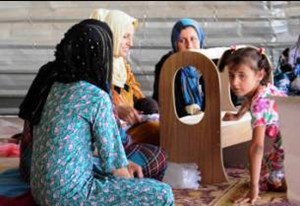Here is the text of Rachel’s presentation, which was part of a wider discussion on religious freedom in Syria and Iraq:
“We hear horrifying stories from Iraq and Syria in the media. Sometimes it is the particularities of suffering and cruelty to individuals that both haunt and galvanise us. For me it was when a friend, recently returned from Kurdistan, told me of meeting traumatised mothers whose daughters had been abducted into sexual slavery by IS. The girls had been ordered to call their mothers by phone and describe their torture – thereby to amplify the terror and grief. But alongside these terrible accounts, my friend also shared stories of generosity and hope – for example of churches in Kurdistan providing shelter for displaced Yazidis alongside Christians.
Scale of humanitarian crisis:
The facts on the ground are simply devastating.
In Syria, nearly 200,000 people have died. 12.2 million need humanitarian aid, along with 3.2 million refugees in neighbouring countries. While in Iraq, 1.8 million people are internally displaced – over half in Kurdistan. And nearly 8000 deaths.
Behind these statistics, lies the horrific impact on individuals and families: violent death, trauma, displacement, rape, abductions and executions. Many communities are targeted because of their religious affiliations – Christians, Yazidis and other sects, as well as different Muslim communities. There are vulnerable pre-existing refugee populations, Palestinians and Iraqis within Syria, and now Syrians within Iraq. A whole generation of children are at risk, growing up without any experience of normality, in the midst of conflict, hunger, displacement and a vortex of extreme ideologies. And all this while another bitter winter fast approaches.
Scope of humanitarian response:
The scale of humanitarian demands on the international community is unprecedented. Add to Syria and Iraq, the conflict-driven crises in South Sudan, DR Congo and beyond, Ebola in West Africa and natural disasters elsewhere. For the Iraqi and Syrian context, all actors need to pull together to respond to immediate humanitarian need – combined with a comprehensive and strategic plan for the long-term.
Parishes and individuals continue to donate generously to many appeals – representing a mixed economy of responses. Here is a brief overview of humanitarian actors linked to the context of the Church of England:
In Syria:
- The UK government through DFID has committed £700 million for Syria and the region, working largely through the UN and NGOs.
- Christian Aid works through the ACT Alliance in the region, including through Orthodox Church charities in Lebanon. Also active are Tearfund, World Vision and many INGOs. Some church agencies, such as Open Doors, focus on supporting vulnerable Christian communities.
In Iraq:
- DFID has committed £23 million in aid, including: £5 million given in June to Christians and others, following attacks on Mosul and the Nineveh plains; aid airdrops for people fleeing onto Mount Sinjar and others trapped by IS advances – as well as ongoing support to the UN response.
- The Diocese of Cyprus and the Gulf channels its appeal through a coalition of churches – Chaldean, Syrian, Armenian and others – supporting Christians and non-Christians in Kurdistan and Baghdad.
- Christian Aid, Tearfund and other agencies work in northern Iraq through local partners, including church partners.
- The Foundation for Reconciliation in the Middle East, operating from St George’s Church in Baghdad, also has a humanitarian programme.
- Other Christian organisations, like the Barnabas Fund and Aid to the Church in Need, are focusing help on Christian communities, providing support and shelter – including an initiative to bring in former military tented camps.
There are many examples of local faith groups reaching out to provide assistance to other faith communities – e.g. mobile health clinics run by a Christian organisation serving displaced Muslims and Yazidis; and Islamic Relief bringing food aid to 1500 Christian families in Mosul. These examples are important because they provide insights into an alternative narrative.
What ways can parishes and individuals in the Church of England respond?
Listen – and learn. Even when Iraq and Syria fall from media headlines – continue to study the unfolding situation. Listen to the voices of the churches there. Connect with leaders of other faiths in our own contexts. Dioceses and parishes could arrange study and prayer days and provide regular updates.
Pray – equipped with a deeper understanding, prayer is the foundation of our response. Prayer for victims and perpetrators. Prayer for protection, provision and perseverance. Prayer that a more positive global narrative will emerge – what Archbishop Justin has called “a more compelling vision… of a more remarkable hope”.
Give – the local Churches have said quite simply: “We need prayer and money. With those two we can do something.” Gifts can be through the Church’s own appeals, such as through the Diocese of Cyprus and the Gulf, and through the range of appeals by Christian agencies, such as Christian Aid, and other international NGOs – as well as affirming the generosity of UK tax payers by supporting our national aid budget of 0.7% of GDP.
Act – It is far from easy to determine how to act in response to complex conflict situations such as these. Different agencies have proposals for actions of solidarity and advocacy. The key point is that any action must derive from an informed place, above all in consultation with local people and local churches, ensuring those on the ground are not put at any further risk. Actions need to build towards peace, reconciliation, restoration of rights and an end to suffering.
In terms of this panel discussion on religious freedoms, our government and the international community need to strengthen their understanding the dynamics of faith and to promote and protect freedom of religion as a core right and as a fundamental ingredient of peace building and stability. The humanitarian crises will only end when the wider global drivers of conflict are addressed.”
Picture credit: The Anglican Diocese of Cyprus and the Gulf, http://cypgulf.org/news/

